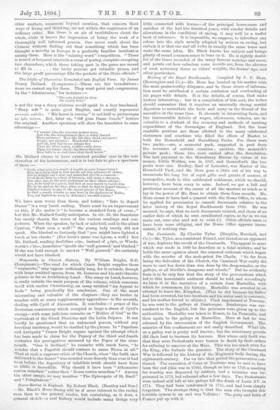The Idylls of Theocritus Translated into English Verse. By James
Henry Hallard. (Longmans.)—These are fair translations ; more we cannot say for them. They want point and compression. In the " Adoniazusae," for instance :—
"The cats delight to sleep On woolly beds,"
is not the way a sharp mistress would speak to a lazy handmaid. " Sleep soft " is quite good English, and exactly represents facaaxiji xedia±u, " His horse is rearing" is not half so picturesque as ,;p0Os iseLsee. But, later on, " Off goes Dame Oracle" betters the original. Another specimen will show the translator to some advantage :— " I wonder who the weaving women were,
And who tho draughtsmen that so deftly limned These pictures I Row like life they stand and move I People, not pictures I Wonderful is man!
And oh, how fair-to-see Adonis lies Upon his silver couch, youth's early down Upon his tender cheek, the thrice-beloved, Dear both to us and those that dwell below."
Mr. Hallard claims to have exercised peculiar care in the con- struction of his hexameters, and it is but fair to give a specimen of them :—
" rocas, what gain is a world of wealth in your houses lying? Wise man deem that in that dwells not true pleasure of riches, But to delight one's soul, and somewhat give to a comrade- (lood deeds done to a host of kinsmen, and many a stranger, Due rites, too, to the gods performed on their altars always— Aye, to be kind to a guest, and first at your board to regale him Bre he be sped on his way, when so that ho lists to depart thence- Chiefest honour to pay to the sacred priests of the Muses, So that a goodly renown ye may have in the darkness of Hades, Yea, nor inglorious weep by Acheron's ice-chill waters."
We have seen worse than these, and better; "lists to depart thence" is a very harsh ending. There must be an improvement on this, if the metre is " to become a standard form of verse ; " 'tut this Mr. Millard fondly anticipates. In xiv. 23, the translator has surely chosen the worst of the various readings and con- jectures. When the speaker, by luck or mischief, said to the silent Cynical, "Hest seen a wolf ?" the young lady surely did not speak. She blushed so furiously that "you might have lighted a torch at her cheeks." (Her lover's name was Lyons, a wolf.) But Mr. Hallard, reading doubtless selepa, instead of xliele, or Words- worth's e'pess, translates " Quoth she well guessed,' and blushed." If she was bold enough to answer " Well guessed," she certainly would not have blushed.

































 Previous page
Previous page